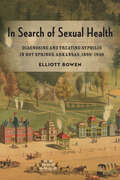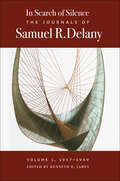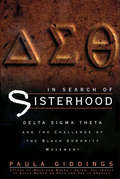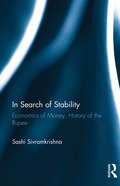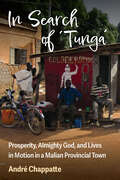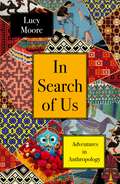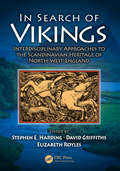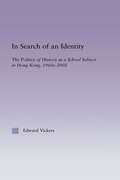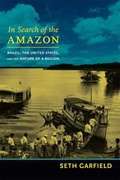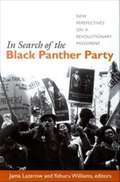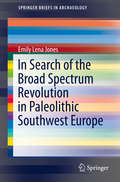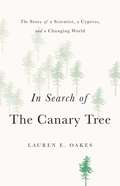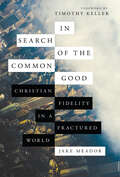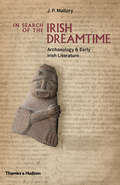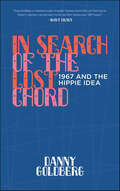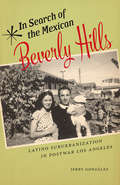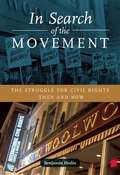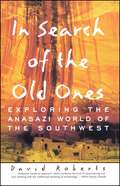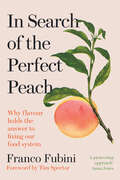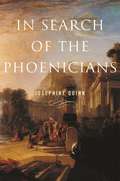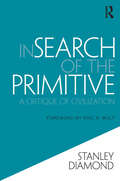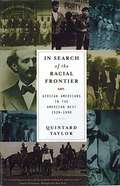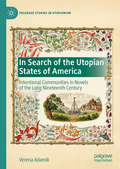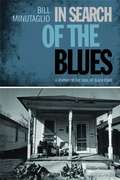- Table View
- List View
In Search of Sexual Health: Diagnosing and Treating Syphilis in Hot Springs, Arkansas, 1890–1940
by Elliott BowenHow did beliefs about syphilis shape the kinds of treatment people with this disease received? The story of how a town in the Ozark hinterlands played a key role in determining standards of medical care around syphilis.During the late 1800s and early 1900s, the central Arkansas city of Hot Springs enjoyed a reputation as one of the United States' premier health resorts. Throughout this period, the vast majority of Americans who traveled there did so because they had (or thought they had) syphilis—a disease whose incidence was said to be dramatically on the rise all across the country. Boasting an impressive medical infrastructure that included private clinics, a military hospital, and a venereal disease clinic operated by the United States Public Health Service, Hot Springs extended a variety of treatment options. Until the antibiotic revolution of the 1940s, Hot Springs occupied a central position in the country's struggle with sexually transmitted disease.Drawing upon health-seekers' firsthand accounts, clinical case files, and the writings of the city's privately practicing specialists, In Search of Sexual Health examines the era's "venereal peril" from the standpoint of medical practice. How, Elliott Bowen asks, did people with VD understand their illnesses, and what therapeutic strategies did they employ? Highlighting the unique role that resident doctors, visiting patients, and local residents played in shaping Hot Springs' response to syphilis, Bowen argues that syphilis's status as a stigmatized disease of "others" (namely prostitutes, immigrants, and African Americans) had a direct impact on the kinds of treatment patients received, and translated into very different outcomes for the city's diverse clientele—which included men as well as women, blacks as well as whites, and the poor as well as the rich.Whereas much of the existing scholarship on the history of sexually transmitted diseases privileges the actions of medical elites and federal authorities, this study reveals Hot Springs, a remote and fairly obscure town, as a local node with a significant national impact on American medicine and public health. Providing a richer, more complex understanding of a critical chapter in the history of sexually transmitted diseases, In Search of Sexual Health will prove valuable to historians of medicine, public health, and the environment, in addition to scholars of race, gender, sexuality.
In Search of Silence: The Journals of Samuel R. Delany, Volume I, 1957-1969 (The Journals of Samuel R. Delany)
by Samuel R. Delany Kenneth R. JamesFor fifty years Samuel Delany has cultivated a special relationship with language in works of fiction, criticism, and memoir that have garnered critical praise and legions of fans. The present volume – the first in a series – reveals a new dimension of his genius. In Search of Silence presents over a decade’s worth of Delany’s private journals, commencing in 1957 when he was still a student at the Bronx High School of Science, and ending in 1969 when he was living in San Francisco and on the verge of reconceiving the novel that would become Dhalgren.In these pages, Delany muses on the writing of the stories that will establish him as a science fiction wunderkind, the early years of his marriage to the poet Marilyn Hacker, performances as a singer-songwriter during the heyday of the American folk revival, travels in Europe, experiences in a New York City commune, and much more – and crosses paths with artists working in many genres, including poets such as Robert Frost, W. H. Auden, and Marie Ponsot, and science fiction writers such as Arthur C. Clarke, Michael Moorcock, Roger Zelazny, and Joanna Russ. Delany scholar Kenneth R. James presents the journal entries alongside generous samplings of story outlines, poetry, fragments of novels and essays that have never seen publication, and more; James also provides biographical synopses and an extensive set of endnotes to supply contextual information and connect journal material to Delany’s published work.
In Search of Sisterhood: Delta Sigma Theta and the Challenge of the Black Sorority Movement
by Paula J. GiddingsThis history of the largest black women's organization in the United States is not only the story of Delta Sigma Theta Sorority (DST), but also tells of the increasing involvement of black women in the political, social, and economic affairs of America. Founded at a time when liberal arts education was widely seen as either futile, dangerous, or impractical for blacks, especially women, DST is, in Giddings's words, a "compelling reflection of block women's aspirations for themselves and for society."<P> Giddings notes that unlike other organizations with racial goals, Delta Sigma Theta was created to change and benefit individuals rather than society. As a sorority, it was formed to bring women together as sisters, but at the some time to address the divisive, often class-related issues confronting black women in our society. There is, in Giddings's eyes, a tension between these goals that makes Delta Sigma Theta a fascinating microcosm of the struggles of black women and their organizations.<P> DST members have included Mary McLeod Bethune, Mary Church Terrell, Margaret Murray Washington, Shirley Chisholm, Barbara Jordan, and, on the cultural side, Leontyne Price, Lena Horne, Ruby Dee, Judith Jamison, and Roberta Flack. In Search of Sisterhood is full of compelling, fascinating anecdotes told by the Deltas themselves, and illustrated with rare early photographs of the Delta women.
In Search of Stability: Economics of Money, History of the Rupee
by Sashi SivramkrishnaIn Search of Stability seeks to understand the economics of money through a narrative on the history of the rupee. The period delineated for study is from the time of introduction of the rupee by Sher Shah Suri in 1542 up to 1971, the year which marked the beginning of the end of the Bretton Woods era and a fixed exchange rate regime. The underlying thread that runs through the narrative is the positive economics of money and history of the rupee. This is a book that explains what happened rather than raising normative questions on what ought to have happened or what could have been a more appropriate monetary system for India. The economics of money also draws us into understanding the evolution of monetary instruments through history and their impact on the economy. These instruments cannot be separated from the institutions that develop and are developed by them. A digression into a study of the origins, nature and development of some of the most important monetary institutions in India has therefore been included in this study. While standards of living have risen enormously, money has struggled to maintain its value across place and time, without definitive success. This has brought with it crises and severe hardship to entire societies; a lesson which the history of the Indian rupee unequivocally reveals.
In Search of Tunga: Prosperity, Almighty God, and Lives in Motion in a Malian Provincial Town (African Perspectives)
by André ChappatteThis volume on Muslim life focuses on young male migrants of rural origin who move to build better lives in Bougouni, a provincial town in southwest Mali. Describing themselves as “simply Muslims” and “adventurers,” these migrants aim to be both prosperous and good Muslims. Drawing upon seventeen months of fieldwork, author André Chappatte explores their sense of prosperity and piety as they embark on tunga (adventure), a customary search for money and more in a tradition that dates back to the colonial period. In the context of the current global war on terrorism, most studies of Muslim life have focused on the politics of piety of reformist movements, their leaders, and members. By contrast, In Search of “Tunga” takes a perspective from below. It opens piety up to “simply Muslims,” although the religious elites have always claimed authority and legitimacy over piety. Is piety an exclusive field of experiences for those who claim to strive for it? What does piety involve for the majority of Muslims, the non-elite and unaffiliated Muslims? This volume “democratizes” piety by documenting its practice as going beyond sharply defined religious affiliations and Islamic scholarship, and by showing it is both alive and normative, existential and prescriptive. As opposed to studies that build on the classic historical connections between the Maghreb and the Sahel, the southbound migration from the Sahel documented in this book stresses the overlooked historical connections between the southern shores of the Sahara and the lands south of those shores. It demonstrates how the Malian savanna, this former buffer-zone between ancient Mande kingdoms and thereafter remote areas of French Sudan, is increasingly becoming central in today’s Sahel contexts of desiccation and insecurity.
In Search of Us: Adventures in Anthropology
by Lucy MooreIn the late nineteenth century when non-European societies were seen merely as 'living fossils' offering an insight into how civilisation had evolved, anthropology was a thriving area of study. But, by the middle of the twentieth century, it was difficult to think about ideas of 'savages' and otherness when 'civilised' man had wreaked such devastation across two world wars, and field work was to be displaced by sociology and the study of all human society.By focusing on thirteen key European and American figures in this field, from Franz Boas on Baffin Island to Zora Neale Hurston in New Orleans and Claude Lévi-Strauss in Brazil, Lucy Moore tells the story of the brief flowering of anthropology as a quasi-scientific area of study, and about the men and women whose observations of the 'other' were unwittingly to come to bear on attitudes about race, gender equality, sexual liberation, parenting and tolerance in ways they had never anticipated. In an enthralling and perceptive narrative, Moore shows how, unintended though it was, these anthropologists were to become pioneers of a new way of thinking. Their legacy is less about understanding far away cultures and more about teaching people to look at one another 'with eyes washed free from prejudice.' Their intention may have been to explain the primitive world to the civilised one, but they ended up by changing the way we think about ourselves - at least for a time.
In Search of Vikings: Interdisciplinary Approaches to the Scandinavian Heritage of North-West England
by David Griffiths Stephen E. Harding Elizabeth RoylesThis book presents a collection of papers from experts in a broad range of disciplines, including history, archaeology, genetics, and linguistics, to provide a detailed understanding of the Vikings in peace and in war. It focuses on one particularly exciting area of the Viking world, namely the north-west section of England, where they are known to have settled in large numbers. The 12 integrated studies in this book are designed to reinvigorate the search for Vikings in this crucial region and to provide must-reading for anyone interested in Viking history.
In Search of an Identity: The Politics of History Teaching in Hong Kong, 1960s-2000 (East Asia: History, Politics, Sociology and Culture)
by Edward VickersFirst Published in 2003. Routledge is an imprint of Taylor & Francis, an informa company.
In Search of the Amazon: Brazil, the United States, and the Nature of a Region
by Seth GarfieldChronicling the dramatic history of the Brazilian Amazon during the Second World War, Seth Garfield provides fresh perspectives on contemporary environmental debates. His multifaceted analysis explains how the Amazon became the object of geopolitical rivalries, state planning, media coverage, popular fascination, and social conflict. In need of rubber, a vital war material, the United States spent millions of dollars to revive the Amazon's rubber trade. In the name of development and national security, Brazilian officials implemented public programs to engineer the hinterland's transformation. Migrants from Brazil's drought-stricken Northeast flocked to the Amazon in search of work. In defense of traditional ways of life, longtime Amazon residents sought to temper outside intervention. Garfield's environmental history offers an integrated analysis of the struggles among distinct social groups over resources and power in the Amazon, as well as the repercussions of those wartime conflicts in the decades to come.
In Search of the Black Panther Party: New Perspectives on a Revolutionary Movement
by Jama Lazerow Yohuru WilliamsControversy swirled around the Black Panthers from the moment the revolutionary black nationalist Party was founded in Oakland, California, in 1966. Since that time, the group that J. Edgar Hoover called "the single greatest threat to the nation's internal security" has been celebrated and denigrated, deified and vilified. Rarely, though, has it received the sort of nuanced analysis offered in this rich interdisciplinary collection. Historians, along with scholars in the fields of political science, English, sociology, and criminal justice, examine the Panthers and their present-day legacy with regard to revolutionary violence, radical ideology, urban politics, popular culture, and the media. The essays consider the Panthers as distinctly American revolutionaries, as the products of specific local conditions, and as parts of other movements of the late 1960s and early 1970s. One contributor evaluates the legal basis of the Panthers' revolutionary struggle, explaining how they utilized and critiqued the language of the Constitution. Others explore the roles of individuals, looking at a one-time Panther imprisoned for a murder he did not commit and an FBI agent who monitored the activities of the Panthers' Oakland branch. Contributors assess the Panthers' relations with Students for a Democratic Society, the Young Lords, the Brown Berets, and the Peace and Freedom Party. They discuss the Party's use of revolutionary aesthetics, and they show how the Panthers manipulated and were manipulated by the media. Illuminating some of the complexities involved in placing the Panthers in historical context, this collection demonstrates that the scholarly search for the Black Panthers has only just begun. Contributors. Bridgette Baldwin, Davarian L. Baldwin, David Barber, Rod Bush, James T. Campbell, Tim Lake, Jama Lazerow, Edward P. Morgan, Jeffrey O. G. Ogbar, Roz Payne, Robert O. Self, Yohuru Williams, Joel Wilson
In Search of the Broad Spectrum Revolution in Paleolithic Southwest Europe
by Emily Lena JonesThe people who inhabited Southwest Europe from 30,000 to 13,000 years ago are often portrayed as big game hunters - and indeed, in some locations (Cantabrian Spain, the Pyrenees, the Dordogne) the archaeological record supports this interpretation. But in other places, notably Mediterranean Iberia, the inhabitants focused their hunting efforts on smaller game, such as rabbits, fish, and birds. Were they less effective hunters? Were these environments depleted of red deer and other large game? Or is this evidence of Paleolithic people's adaptability? This volume explores these questions, along the way delving into the history of the "bigger equals better" assumption; optimal foraging theory and niche construction theory; and patterns of environmental and subsistence change across the Pleistocene-Holocene transition.
In Search of the Canary Tree: The Story of a Scientist, a Cypress, and a Changing World
by Lauren E. OakesThe surprisingly hopeful story of one woman's search for resiliency in a warming worldSeveral years ago, ecologist Lauren E. Oakes set out from California for Alaska's old-growth forests to hunt for a dying tree: the yellow-cedar. With climate change as the culprit, the death of this species meant loss for many Alaskans. Oakes and her research team wanted to chronicle how plants and people could cope with their rapidly changing world. Amidst the standing dead, she discovered the resiliency of forgotten forests, flourishing again in the wake of destruction, and a diverse community of people who persevered to create new relationships with the emerging environment. Eloquent, insightful, and deeply heartening, In Search of the Canary Tree is a case for hope in a warming world.
In Search of the Common Good: Christian Fidelity in a Fractured World
by Jake MeadorCommon life in our society is in decline. Our communities are disintegrating, as the loss of meaningful work and the breakdown of the family leave us anxious and alone—indeed, half of all Americans report daily feelings of loneliness. Our public discourse is polarized and hateful. Ethnic minorities face systemic injustices and the ever-present fear of violence and deportation. Economic inequalities are widening. In this book, Jake Meador diagnoses our society's decline as the failure of a particular story we've told about ourselves: the story of modern liberalism. He shows us how that story has led to our collective loss of meaning, wonder, and good work, and then recovers each of these by grounding them in a different story—a story rooted in the deep tradition of the Christian faith. Our story doesn't have to end in loneliness and despair. There are reasons for hope—reasons grounded in a different, better story. In Search of the Common Good reclaims a vision of common life for our fractured times: a vision that doesn't depend on the destinies of our economies or our political institutions, but on our citizenship in a heavenly city. Only through that vision—and that citizenship—can we truly work together for the common good.
In Search of the Irish Dreamtime: Archaeology and Early Irish Literature
by J. P. MalloryIreland's oldest traditions excavated via archaeological, genetic, and linguistic research, culminating in atruly groundbreaking publication Following his account of Irish origins drawing on archaeology, genetics, and linguistics, J. P. Mallory returns to the subject to investigate what he calls the Irish Dreamtime: the native Irish retelling of their own origins, as related by medieval manuscripts. He explores the historical backbone of this version of the earliest history of Ireland, which places apparently mythological events on a concrete timeline of invasions, colonization, and royal reigns that extends even further back in time than the history of classical Greece. The juxtaposition of traditional Dreamtime tales and scientific facts expands on what we already know about the way of life in Iron Age Ireland. By comparing the world depicted in the earliest Irish literary tradition with the archaeological evidence available on the ground, Mallory explores Ireland's rich mythological tradition and tests its claims to represent reality.
In Search of the Lost Chord: 1967 and the Hippie Idea
by Danny GoldbergThis paperback edition of Goldberg’s highly acclaimed homage to 1967 includes a new afterword and twenty beautiful and evocative photographs.“Antiwar radicals, recoiling from soullessness, challenged the church of technocratic rationality. Taking this challenge seriously, recovering the mood of an extended moment, requires beginning earlier and ending later than 1968. Cultural upheaval cannot be confined by the calendar. At least one contribution to the literature, the music industry executive Danny Goldberg’s In Search of the Lost Chord, treats 1967 as the defining moment when ‘the hippie idea’ still held transformational promise, and countercultural protest had not yet succumbed to police violence, undercover provocateurs, or media caricature—while 1968, in contrast, was a dark time of assassinations, riots, and the resurgence of the right.” —New York Review of Books“[Goldberg’s] newest book, In Search of the Lost Chord: 1967 and the Hippie Idea, explores and fuses together the musical, political, and spiritual revolutions of the time into a narrative about a moment when ‘there was an instant sense of tribal intimacy one could have even with a stranger.'” —Rolling StoneIn Search of the Lost Chord is a subjective history of 1967, the year Danny Goldberg graduated from high school. It is also a refreshing and new analysis of the era; by looking at not only the political causes, but also the spiritual, musical, and psychedelic movements, Goldberg provides a unique perspective on how and why the legacy of 1967 lives on today. 1967 was the year of the release of the Beatles’ Sgt. Pepper’s Lonely Hearts Club Band, and of debut albums from the Doors, the Grateful Dead, Jimi Hendrix, and Janis Joplin, among many others. 1967 was also the year of the Summer of Love; the year that millions of now-illegal LSD tabs flooded America; Muhammad Ali was convicted of avoiding the draft; Martin Luther King Jr. publicly opposed the war in Vietnam; Stokely Carmichael championed Black Power; Israel won the Six-Day War; and Che Guevara was murdered. It was the year that hundreds of thousands of protesters vainly attempted to levitate the Pentagon. It was the year the word “hippie” peaked and died, and the Yippies were born. Exhaustively researched and informed by interviews and conversations with Allen Ginsberg, Timothy Leary, Ram Dass, Tom Hayden, Cora Weiss, Grace Slick, and others, In Search of the Lost Chord is a mosaic of seminal moments in the psychedelic, spiritual, rock-and-roll, and political protest cultures of 1967. This paperback edition includes a brand-new afterword by the author, along with twenty photographs by Peter Simon.
In Search of the Mexican Beverly Hills: Transnational Cultures in the United States)
by Jerry GonzálezResidential and industrial sprawl changed more than the political landscape of postwar Los Angeles. It expanded the employment and living opportunities for millions of Angelinos into new suburbs. In Search of the Mexican Beverly Hills examines the struggle for inclusion into this exclusive world—a multilayered process by which Mexican Americans moved out of the barrios and emerged as a majority population in the San Gabriel Valley—and the impact that movement had on collective racial and class identity. Contrary to the assimilation processes experienced by most Euro-Americans, Mexican Americans did not graduate to whiteness on the basis of their suburban residence. Rather, In Search of the Mexican Beverly Hills illuminates how Mexican American racial and class identity were both reinforced by and took on added metropolitan and transnational dimensions in the city during the second half of the twentieth century.
In Search of the Movement
by Benjamin Hedin"Benjamin Hedin went looking for the civil rights movement's past, but he also ran smack into the present, which can suddenly look like the past and then just as suddenly look totally different. By bringing stirring people like Septima Clark into focus, Hedin does what good historians do, but by entwining history with current events, he does a lot more. Here is a haunting meditation on living in history as well as with it."--Sean Wilentz, author of The Rise of American Democracy: Jefferson to LincolnIn March of 1965, Martin Luther King led thousands in an epic march from Selma, Alabama to the state capital in Montgomery, in what is often seen as the culminating moment of the Civil Rights movement. The Voting Rights Act was signed into law that year, and with Jim Crow eradicated, and schools being desegregated, the movement had supposedly come to an end. America would go on to record its story as an historic success.Recently, however, the New York Times featured an article that described the reversion of Little Rock's schools to all-black or all-white. The next day, the paper printed a story about a small town in Alabama where African Americans were being denied access to the polls. Massive demonstrations in cities across the country protest the killing of black men by police, while we celebrate a series of 50th-anniversary commemorations of the signature events of the Civil Rights movement. In such a time it is important to ask: In the last fifty years, has America progressed on matters of race, or are we stalled--or even moving backward?With these questions in mind, Benjamin Hedin set out to look for the Civil Rights movement. "I wanted to find the movement in its contemporary guise," he writes, "which also meant answering the critical question of what happened to it after the 1960s." He profiles legendary figures like John Lewis, Robert Moses, and Julian Bond, and also visits with contemporary leaders such as William Barber II and the staff of the Dream Defenders. But just as powerful--and instructional--are the stories of those whose work goes unrecorded, the organizers and teachers who make all the rest possible.In these pages the movement is portrayed as never before, as a vibrant tradition of activism that remains in our midst. In Search of the Movement is a fascinating meditation on the patterns of history, as well as an indelible look at the meaning and limits of American freedom.Benjamin Hedin has written for the New Yorker, Slate, the Nation, and the Chicago Tribune. He's the editor of Studio A: The Bob Dylan Reader, and the producer and author of a forthcoming documentary film, The Blues House.
In Search of the New Woman: Middle-Class Women and Work in Britain 1870-1914
by Gillian SutherlandThe 'New Women' of late nineteenth-century Britain were seen as defying society's conventions. Studying this phenomenon from its origins in the 1870s to the outbreak of the Great War, Gillian Sutherland examines whether women really had the economic freedom to challenge norms relating to work, political action, love and marriage, and surveys literary and pictorial representations of the New Woman. She considers the proportion of middle-class women who were in employment and the work they did, and compares the different experiences of women who went to Oxbridge and those who went to other universities. Juxtaposing them against the period's rapidly expanding but seldom studied groups of women white-collar workers, the book pays particular attention to clerks and teachers and their political engagement. It also explores the dividing lines between ladies and women, the significance of respectability and the interactions of class, status and gender lying behind such distinctions.
In Search of the Old Ones: Exploring the Anasazi World of the Southwest
by David RobertsThe Anasazi, ancestors of the Pueblo people, inhabited the Southwest for at least 5,000 years. David Roberts' extensive interviews and back country travels create a richly detailed portrait of an enigmatic people.
In Search of the Perfect Peach: Why flavour holds the answer to fixing our food system
by Franco FubiniWITH A FOREWORD FROM TIM SPECTOR, author of The Diet Myth, Spoon-Fed and Food for Life ‘This book is a passionate rallying call for a change of mindset…’ Mail on Sunday "A pioneering approach."—Anna Jones, cook and bestselling author of Easy Wins "By valuing and reclaiming flavour, Franco argues that we can transform the system and also enrich our relationship with food. Essential reading."—Dan Saladino, journalist, broadcaster and author of Eating to Extinction Let flavour guide our food choices – and lead us to a better food future. In Search of the Perfect Peach shows us how this simple desire can bring about a healthier, tastier and brighter future for our food, the people who produce it and the soil it grows in. That first bite of a perfectly ripe peach can be truly transformative – a joyful moment that will stay with you forever. For Franco Fubini, founder and CEO of Natoora, this encounter also leads him to realise that flavour is not simply a fleeting, visceral experience but a window into the farmer, a connection to our natural environment and a taste test for our food system. What makes a great-tasting tomato? Why is scarring on a greengage a good sign? Does ‘eating local’ narrow our priorities to the exclusion of others? In Search of the Perfect Peach follows Franco as he navigates the food system in pursuit of this elusive element. As he takes us from Sicily’s citrus groves to the streets of Mexico City, he shows how we have allowed the wider industry to compromise on more than just flavour. Franco’s search for the Greta peach culminates in his own clarity and conviction: by looking to flavour, we can unpick the industrialisation of our food production, restore nutrition and seasonal diversity to our plates and the craft of growing back to our landscapes. And, above all, we can find that perfect peach every summer. "This exciting and important book now brings Natoora and all its ingredients not just to restaurants like ours but … to everyone’s home."—Ruth Rogers, chef and co-founder of The River Cafe "An incredible read for those who love food and care about its future. In Search of the Perfect Peach is both a love story and technical guide."—Kyle Connaughton, chef and owner of SingleThread Farm, Restaurant and Inn
In Search of the Phoenicians (Miriam S. Balmuth Lectures in Ancient History and Archaeology)
by Josephine QuinnWho were the ancient Phoenicians, and did they actually exist?The Phoenicians traveled the Mediterranean long before the Greeks and Romans, trading, establishing settlements, and refining the art of navigation. But who these legendary sailors really were has long remained a mystery. In Search of the Phoenicians makes the startling claim that the “Phoenicians” never actually existed. Taking readers from the ancient world to today, this monumental book argues that the notion of these sailors as a coherent people with a shared identity, history, and culture is a product of modern nationalist ideologies—and a notion very much at odds with the ancient sources.Josephine Quinn shows how the belief in this historical mirage has blinded us to the compelling identities and communities these people really constructed for themselves in the ancient Mediterranean, based not on ethnicity or nationhood but on cities, family, colonial ties, and religious practices. She traces how the idea of “being Phoenician” first emerged in support of the imperial ambitions of Carthage and then Rome, and only crystallized as a component of modern national identities in contexts as far-flung as Ireland and Lebanon.In Search of the Phoenicians delves into the ancient literary, epigraphic, numismatic, and artistic evidence for the construction of identities by and for the Phoenicians, ranging from the Levant to the Atlantic, and from the Bronze Age to late antiquity and beyond. A momentous scholarly achievement, this book also explores the prose, poetry, plays, painting, and polemic that have enshrined these fabled seafarers in nationalist histories from sixteenth-century England to twenty-first century Tunisia.
In Search of the Primitive: A Critique of Civilization (Routledge Classic Texts in Anthropology)
by Stanley DiamondAnthropology is a kind of debate between human possibilities—a dialectical movement between the anthropologist as a modern man and the primitive peoples he studies. In Search of the Primitive is a tough-minded book containing chapters ranging from encounters in the field to essays on the nature of law, schizophrenia and civilization, and the evolution of the work of Claude Lévi-Strauss. Above all it is reflective and self-critical, critical of the discipline of anthropology and of the civilization that produced that discipline. Diamond views the anthropologist who refuses to become a searching critic of his own civilizations as not merely irresponsible, but a tool of Western civilization. He rejects the associations which have been made in the ideology of our civilization, consciously or unconsciously, between Western dominance and progress, imperialism and evolution, evolution and progress.
In Search of the Racial Frontier: African Americans in the American West 1528-1990
by Quintard Taylor"This is an enthralling work that will be essential reading for years to come. You finish it understanding how integral a part blacks were of the making of the West and, indeed, America." -- David Nicholson, Washington Post A landmark history of African Americans in the West, In Search of the Racial Frontier rescues the collective American consciousness from thinking solely of European pioneers when considering the exploration, settling, and conquest of the territory west of the Mississippi. From its surprising discussions of groups of African American wholly absorbed into Native American culture to illustrating how the largely forgotten role of blacks in the West helped contribute to everything from the Brown vs. Board of Education desegregation ruling to the rise of the Black Panther Party, Quintard Taylor fills a major void in American history and reminds us that the African American experience is unlimited by reion or social status. "[Rich] in scope and scholarly detail -- it will certinaly stand as the definitive work on the subject for some time to come." -- James A. Miller, Boston Globe "[B]y far the most complete general history of blacks in the West." -- Scott L. Malcolmson, Newsday "An absorbing chronicle." -- Publisher's Weekly "Those looking for a solid overview of the African-American presence in our region would do well to let Quintard Taylor be their guide." -- John C. Walter, Seattle Times
In Search of the Utopian States of America: Intentional Communities in Novels of the Long Nineteenth Century (Palgrave Studies in Utopianism)
by Verena AdamikThis book endeavours to understand the seemingly direct link between utopianism and the USA, discussing novels that have never been brought together in this combination before, even though they all revolve around intentional communities: Imlay’s The Emigrants (1793), Hawthorne’s The Blithedale Romance (1852), Howland’s Papas Own Girl (1874), Griggs’s Imperium in Imperio (1899), and Du Bois’s The Quest of the Silver Fleece (1911). They relate nation and utopia not by describing perfect societies, but by writing about attempts to immediately live radically different lives. Signposting the respective communal history, the readings provide a literary perspective to communal studies, and add to a deeply necessary historicization for strictly literary approaches to US utopianism, and for studies that focus on Pilgrims/Puritans/Founding Fathers as utopian practitioners. This book therefore highlights how the authors evaluated the USA’s utopian potential and traces the nineteenth-century development of the utopian imagination from various perspectives.
In Search of the blues
by Bill MinutaglioThe rich, complex lives of African Americans in Texas were often neglected by the mainstream media, which historically seldom ventured into Houston’s Fourth Ward, San Antonio’s East Side, South Dallas, or the black neighborhoods in smaller cities. When Bill Minutaglio began writing for Texas newspapers in the 1970s, few large publications had more than a token number of African American journalists, and they barely acknowledged the things of lasting importance to the African American community. Though hardly the most likely reporter—as a white, Italian American transplant from New York City—for the black Texas beat, Minutaglio was drawn to the African American heritage, seeking its soul in churches, on front porches, at juke joints, and anywhere else that people would allow him into their lives. His nationally award-winning writing offered many Americans their first deeper understanding of Texas’s singular, complicated African American history. This eclectic collection gathers the best of Minutaglio’s writing about the soul of black Texas. He profiles individuals both unknown and famous, including blues legends Lightnin’ Hopkins, Amos Milburn, Robert Shaw, and Dr. Hepcat. He looks at neglected, even intentionally hidden, communities. And he wades into the musical undercurrent that touches on African Americans’ joys, longings, and frustrations, and the passing of generations. Minutaglio’s stories offer an understanding of the sweeping evolution of music, race, and justice in Texas. Moved forward by the musical heartbeat of the blues and defined by the long shadow of racism, the stories measure how far Texas has come . . . or still has to go.
